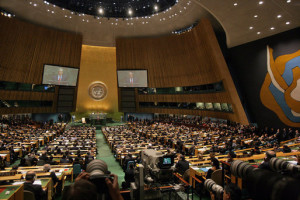 PURCELLVILLE, Va. — A Christian homeschooling organization is warning that a UN treaty approved this week by the U.S. Senate Foreign Relations Committee may threaten the rights of American parents to make their own decisions about their child’s care if that child is disabled.
PURCELLVILLE, Va. — A Christian homeschooling organization is warning that a UN treaty approved this week by the U.S. Senate Foreign Relations Committee may threaten the rights of American parents to make their own decisions about their child’s care if that child is disabled.
On Tuesday, the Committee voted 12-6 in favor of the UN Convention on the Rights of Persons with Disabilities. The vote was mostly along party lines, with the exception of Republican Sens. John McCain (AZ) and John Barrasso (WY), who approved of the proposal.
While the treaty aims to provide protections for disabled persons worldwide, some state that the means in which to carry out the United Nations’ interests are flawed and oppressive. Michael Farris, founder and chairman of the Homeschool Legal Defense Association (HSLDA), opined in a press release this week that the treaty can be used by government officials to override the will of parents by citing the agreement’s clause referencing “the best interests of the child.”
“We all want to show our support for people with disabilities,” he stated. “This treaty, however, is not the way to do it. This treaty will give United Nations and government agents—not parents who know their children better than any government agency could—the authority to decide all educational and treatment issues for disabled children. All of the rights that parents have under traditional American law, the Americans with Disabilities Act, and the Individuals with Disabilities Education Act, will be undermined by this treaty.”
Some support the treaty because of several Congressional reservations, understandings and declarations (“RUDs”) that have been added as amendments, but Farris says that the RUD’s aren’t enough.
“The RUDs cannot change two central problems with the treaty,” he stated. “First, it will still violate the premise that America should make the law for Americans. We may modify the technical aspects of the treaty with RUDs, but we are still agreeing to be bound by the standards of the UN.”
“Second, the promises made by proponents that U.S. ratification will help disabled Americans when they travel internationally is still an empty lie. The idea that U.S. ratification will change the legal duty of any other country to comply with this treaty is legally preposterous,” Ferris continued. “U.S. ratification only changes American law. No one has proven why American law needs to be changed to match UN standards.”
The treaty has failed to garner enough votes in past legislative efforts, which some credit to the opposition of homeschooling families who have children with special needs. Parents had feared that the treaty might interfere with their right to homeschool and care for their child as they see fit.
HSLDA points back to the recent Romeike asylum case as evidence of the continued threat to personal liberty. As previously reported, Ewe and Hannelore Romeike escaped Germany in 2008 after authorities demanded that they stop homeschooling in violation of national law. An immigration judge initially granted asylum, but the Obama administration fought the ruling up to the U.S. Supreme Court. After the court declined to hear the case, the Department of Homeland Security advised that it would grant the family “indefinite deferred action status” and not deport them as threatened.
“In the Romeike family proceedings, the United States government rejected the idea that homeschooling is a protected right under international human rights law despite very clear language in treaties,” Ferris stated. “If treaty language (a superior source of law) is not respected to protect the rights of homeschooling parents, then there is no way that RUDs designed to protect our rights (an inferior source of law) will be respected.”
“Do we dare to submit our God-given liberty to homeschool to a collusion of the U.S. government and the United Nations and be pacified by a second-rate source of legal ‘protection?'” he asked. “There is only one action that can assuredly stop the threat posed by the UN Convention on the Rights of Persons with Disabilities—the treaty must be defeated.”
A vote on the treaty must now move to the full Senate, but a timeline of when the vote might take place is yet unknown.
Become a Christian News Network Supporter...


